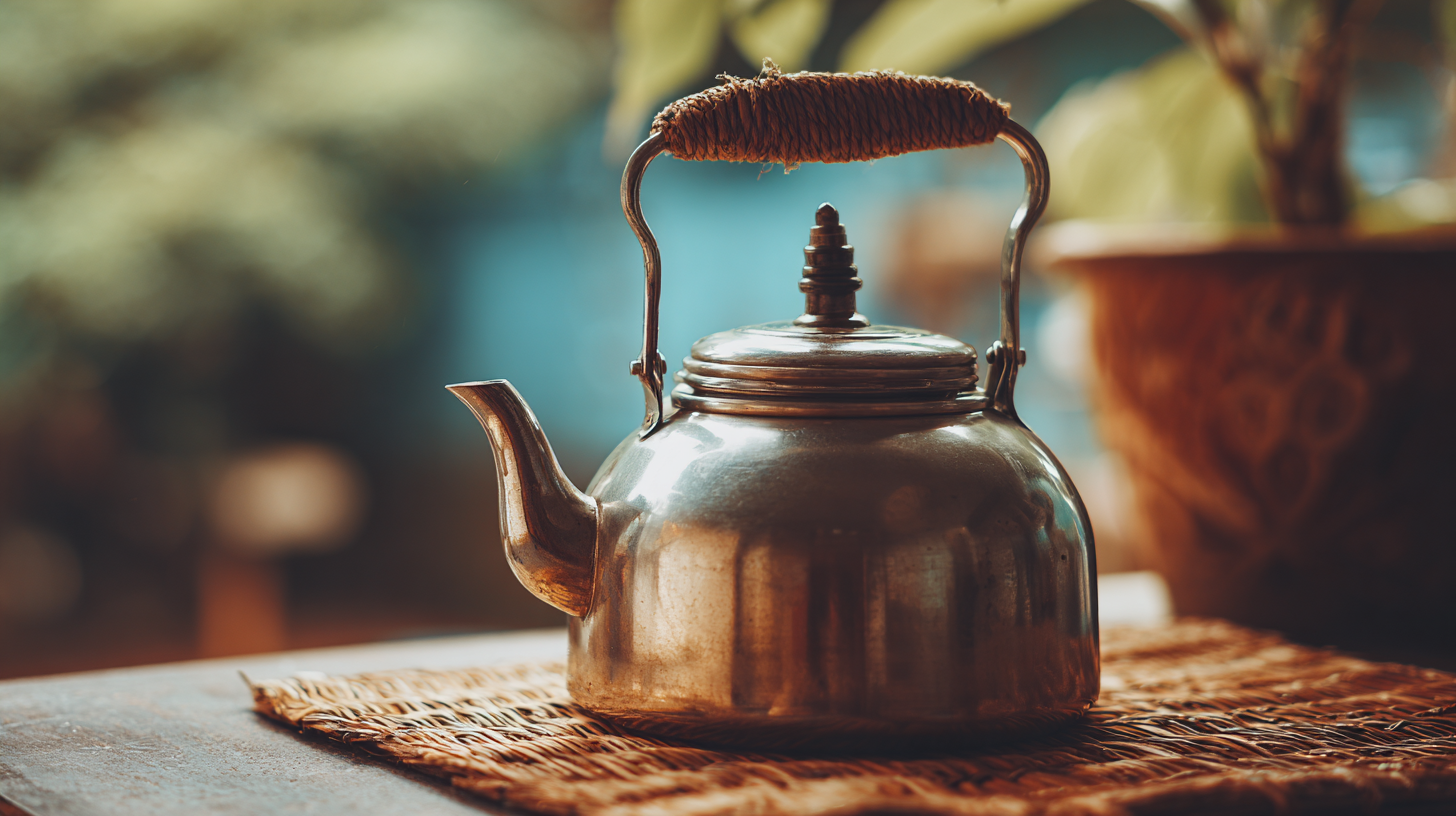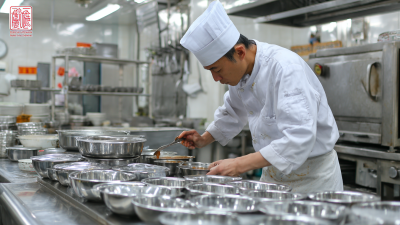The quest for healthier drinking water has led many consumers to explore various cooking and storage options. One of the standout choices is the Stainless Steel Kettle, which not only offers aesthetic appeal but also significant health benefits. According to a report by the World Health Organization, the quality of drinking water is paramount to public health, with contaminants being a leading cause of waterborne diseases.
 Stainless steel is known for its durability and resistance to corrosion, which minimizes the leaching of chemicals commonly found in plastic kettles. Furthermore, research has shown that stainless steel can effectively reduce the growth of harmful bacteria, ensuring that the water you consume is safer. By opting for a Stainless Steel Kettle, not only are consumers making a greener choice, but they are also investing in their long-term health, making it an ideal solution for those prioritizing quality hydration.
Stainless steel is known for its durability and resistance to corrosion, which minimizes the leaching of chemicals commonly found in plastic kettles. Furthermore, research has shown that stainless steel can effectively reduce the growth of harmful bacteria, ensuring that the water you consume is safer. By opting for a Stainless Steel Kettle, not only are consumers making a greener choice, but they are also investing in their long-term health, making it an ideal solution for those prioritizing quality hydration.
When it comes to choosing a kettle for boiling water, stainless steel offers a myriad of advantages over traditional materials like plastic or aluminum. One significant benefit is that stainless steel is non-reactive, which means it won’t leach toxins into your drinking water. Unlike certain plastics that can release harmful chemicals when heated, stainless steel ensures that your water remains pure and free from contaminants, promoting healthier drinking habits for you and your family.
Moreover, stainless steel kettles are highly durable and resistant to corrosion, making them a long-lasting investment. They don’t retain odors or flavors, which can occur with plastic kettles. This feature is particularly important for those who enjoy flavored beverages, as it allows the true taste of the drink to shine through without interference from previous contents.
Tips for selecting the right stainless steel kettle include looking for options with a double-walled design for better heat retention and safety during use. Also, consider models with an ergonomic handle that stays cool to the touch, ensuring a comfortable and secure grip. Finally, choose kettles with a wider opening for easy cleaning, as maintaining hygiene is crucial for your health.
When it comes to selecting a kettle for boiling water, the material can significantly impact water quality and taste. Stainless steel kettles are increasingly favored not only for their durability but also for their ability to maintain the integrity of the water being heated. According to a study published by the International Journal of Environmental Research and Public Health, stainless steel does not leach harmful chemicals into the water, a common concern associated with plastic kettles. This means that users can enjoy a cleaner, safer drinking experience without the risk of toxins leaching into their beverages.

Moreover, stainless steel is known for its neutrality in taste, which allows the natural flavor of the water to shine through. A survey conducted by the Beverage Marketing Corporation found that consumers reported a marked improvement in the taste of boiled water when using stainless steel rather than aluminum or plastic alternatives. The study indicated that 78% of respondents preferred the taste of water boiled in stainless steel kettles, reinforcing the idea that material choice plays a critical role in enhancing drinking water's flavor profile. By opting for stainless steel kettles, individuals can not only ensure healthier drinking water but also enjoy a more satisfying beverage experience.
 Boiling water has long been recognized as one of the most effective methods for purifying drinking water. When using a
stainless steel kettle, you not only ensure safe boiling but also gain several health benefits that are supported by industry reports. According to the
World Health Organization, boiling water kills pathogens, including viruses, bacteria, and parasites, making it a reliable method for ensuring water safety.
Stainless steel kettles, in particular, provide a contaminant-free option, helping to avoid potential leaching of harmful chemicals found in plastic kettles.
Boiling water has long been recognized as one of the most effective methods for purifying drinking water. When using a
stainless steel kettle, you not only ensure safe boiling but also gain several health benefits that are supported by industry reports. According to the
World Health Organization, boiling water kills pathogens, including viruses, bacteria, and parasites, making it a reliable method for ensuring water safety.
Stainless steel kettles, in particular, provide a contaminant-free option, helping to avoid potential leaching of harmful chemicals found in plastic kettles.
Furthermore, stainless steel is known for its durability and resistance to corrosion. Studies show that stainless steel kettles do not leach harmful substances into the water, unlike some materials that can alter water quality.
This is especially crucial for long-term health, as prolonged exposure to toxins can have detrimental effects on bodily functions. Additionally, a report published by the
National Sanitation Foundation highlights that stainless steel is easier to clean and maintain, reducing the risk of bacteria build-up.
Tip: To maximize the health benefits of boiling water, ensure your kettle is made from high-quality stainless steel and regularly clean it to prevent any potential build-up. Also, allow the water to reach a
rolling boil for at least one minute to ensure effective pathogen elimination.
Stainless steel kettles stand out not only for their health benefits but also for their remarkable durability and longevity. Unlike plastic or glass kettles, stainless steel is resistant to rust, corrosion, and staining, making it an ideal choice for frequent use in kitchens. This resilient material can withstand high temperatures without degrading, ensuring that the kettle will maintain its structural integrity over time. Furthermore, stainless steel kettles do not leach chemicals, ensuring that water remains pure and free from contaminants.
In addition to resisting wear and tear, stainless steel kettles often come with warranties that reflect their expected lifespan. With proper care, these kettles can last for many years, proving to be a cost-effective investment in the long run. They are also easy to clean and maintain, which contributes to their enduring appeal. The combination of durability and an ability to provide healthy drinking water makes stainless steel kettles a wise choice for anyone looking to enhance their kitchenware while prioritizing their health.
The increasing awareness of health and environmental issues has led to a growing preference for stainless steel products, particularly in the hydration sector. With the South African water bottle market projected to grow from USD 139.3 million in 2024 to USD 201.55 million by 2032 at a compound annual growth rate (CAGR) of 4.73%, the demand for stainless steel kettles as a healthier drinking option is on the rise. Unlike plastic bottles, which may leach microplastics into water over time, stainless steel offers a safer alternative, ensuring that consumers enjoy clean and untainted water.
Additionally, the global market for stainless steel floor drains, expected to increase from USD 119.14 million in 2022 to USD 160.973 million by 2031, reflects the broader trend of utilizing stainless steel in various applications thanks to its durability and resistance to corrosion. These properties not only contribute to a healthier drinking environment but also align with sustainable practices by reducing reliance on single-use plastic bottles. As more consumers become environmentally-conscious, the shift towards stainless steel is likely to redefine hydration habits and support a more sustainable future.












